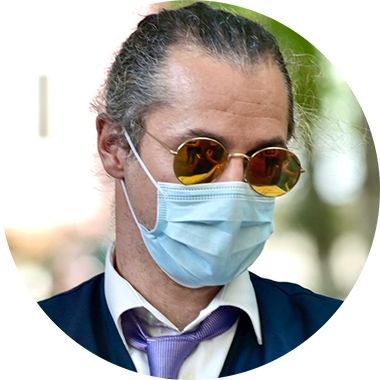
Vasily Esenamanov
Country Preparedness & International Health Regulations Officer,
Health Emergencies Programme - Georgia Country Office

Vasily Esenamanov grew up in a diplomatic family and moved around a lot while growing up. He was exposed to cultures, languages and the international setting that was to become familiar to him in his career in public health. He didn’t set out to work in public health or the United Nations system, but he became inspired while working in a junior technical programme job for the Global Fund. Working with tuberculosis, HIV/AIDS and malaria programmes fascinated Vasily. He learned about the facets of managing these diseases and the range of NGOs, civil society and community-based organizations interested in implementing funding in prevention, treatment, access and continued care. He was also involved in monitoring the impact of their work and on setting up policies with the Ministry of Health that would facilitate the health care transition in the newly independent nation of his home country, Kyrgyzstan. He found the steep learning curve to be challenging, but the rewards were in seeing the full cycle of the programme, from conception to the benefits delivered to the vulnerable target groups of the community. This motivated him to pursue a master’s degree in international development, with a focus on health policies and global public health. During his studies he focused on health systems and health legislation, and paired with previous working experience with universal health coverage strategies and access to essential health services, it became clear to Vasily that WHO was the ultimate goal for a career in international public health.
He gained more experience working on projects targeting health care access for migrants, and then managed to combine his personal aspiration to work in Cairo with a successful application to join WHO Regional Office for the Eastern Mediterranean, via the Junior Professional Officer programme (JPO). In Cairo he worked on health system policy, planning and health legislation. A lot of his work was affected by conflicts or included emergency aspects to it, and after 3 years in Cairo, he was drawn to a job in the Health Emergencies Programme with a focus on country emergency preparedness and International Health Regulations at the WHO Regional Office for Europe in Copenhagen.
Today, Vasily lives in Tbilisi, Georgia, and coordinates teams of international and national experts for WHO Health Emergencies Programme in the south Caucasus. He is clearly proud of his team, their work and the impact they’ve had on fighting the COVID-19 pandemic in Armenia, Azerbaijan and Georgia. He sees their contributions everywhere: in improved testing and treatment, hospital readiness, infection prevention and control, and the distribution of essential equipment to health care facilities.
He explains how at the beginning of a large-scale emergency like the COVID-19 pandemic, the technical experts are deployed to help a country’s health system set up essential pillars of public health response, such as laboratories, hospitals, epidemiological surveillance, response coordination mechanisms, communication and community engagement and so on. This ensures that cases of infection are detected quickly, that patients are treated in accordance with the latest scientific data and that they cannot infect each other while staying in a hospital. Cases are also tracked and statistics are gathered to guide the path forward. These actions help to reduce suffering and minimize death rates both nationally and globally.
“Our team has worked extremely hard during the pandemic, but I’m fuelled by seeing our initial ideas and decisions materialize in the health systems and seeing them function every day…”
Even when there were no flights and borders were closed, the teams continued to work virtually by advising, building and supporting country health systems to provide populations with access to healthcare in the three countries using the WHO standards that Vasily had learned during his studies years before. He coordinates with WHO’s procurement hubs to ensure the swift supply of personal protective equipment, test kits and biomedical equipment that is needed for the healthcare workers to fight the pandemic. This work is supplemented by training and other capacity building activities to ensure effective use of the provided supplies. In addition, Vasily coordinates with the communications teams and the relevant government
bodies for evidence-based messaging on infection prevention methods aimed at different audiences of the population and to fight misinformation. As of recently, there is increased focus on vaccination, and WHO is supporting and monitoring vaccine rollout.
Vasily explains that an essential part of WHO’s work at the country level is health emergency preparedness, since emergencies with negative impacts on human health are becoming more prominent. He highlights the need for a whole-of-government approach and resource mobilization mechanisms that ensure better preparedness in the future. His initial studies in international relations provide him with a broad base to work with the national governments at WHO’s sub-regional level, and he continues to be inspired by his full engagement in the cycle, from planning programmes to monitoring and strengthening health systems so that no-one is left behind.

